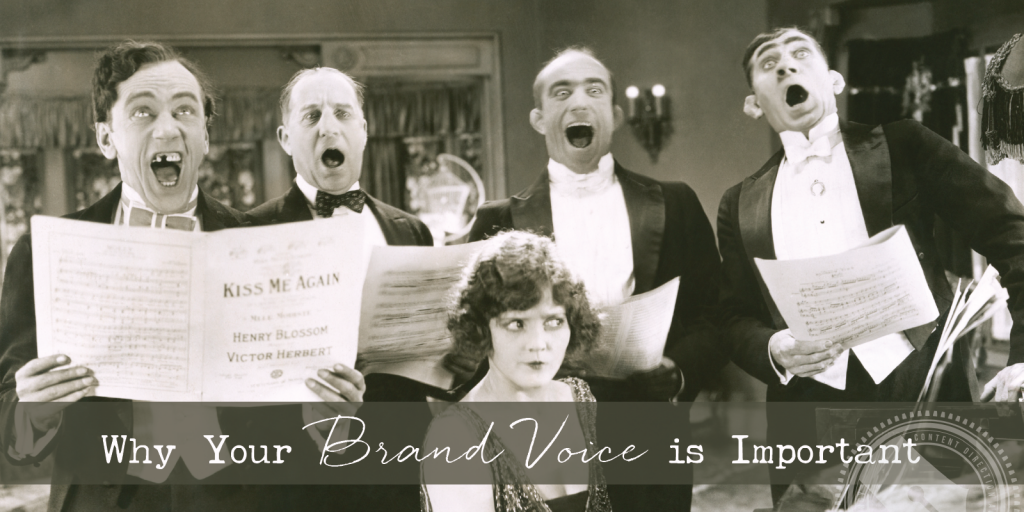I had one of my advanced content marketing students ask me recently, “What should I be focusing on?” She’s working on blogging strategically and consistently, but she wanted to know — what’s next?
The answer, of course, is “it depends.” My answer for her will likely be different than my answer for you, because you are running different businesses. One business may be killing it on Instagram, another Periscope, and another Facebook or Twitter.
But there’s one thing that remains consistent, no matter what your business is, no matter what medium you’re using to communicate: your voice.
Your voice – the things you talk about and how you talk about them – is the most important part of your brand, no matter what media channel you use to broadcast it. Your voice communicates your value and informs your audience. It’s where your customer’s needs and your experiences meet. And most importantly, it’s how your audience recognizes you — no matter where you’re communicating with them.

What happens when your brand voice is out of tune.
Here are some scary stats:
- 81% of consumers have either un-liked a brand’s Facebook page or removed its posts from their Facebook timeline.
- 71% of consumers are being choosier about liking a company on Facebook or following a brand on Twitter.
- 41% of consumers have un-followed a brand’s handle on Twitter.
- And a whopping 97% of the marketing e-mailers sent by companies are marked as SPAM.
What’s the main reason behind all of these? My guess: An unengaging, or out of place brand voice.
Online audiences get bored and irritated very quickly if your content doesn’t appeal to them, doesn’t make sense, isn’t what they came to you for, or isn’t relevant to them. And if any of those things are true, they won’t think twice about breaking up with your brand — or never following you in the first place.
In fact, if your business isn’t getting the likes, follows or traffic you anticipated, then it may be a sign that your brand voice needs a tune-up.
Your brand voice must be in tune with your customers.
I’ve seen this funny trend going around a bit lately in the entrepreneurial circles I run in. Someone will post saying that she got a ton of unsubscribes or lost a lot of likes or follows because of a particular email she sent, a video she posted, or a Facebook rant.
But it’s OK! she assures everyone, because she was being authentic and if those people left, then they weren’t her ideal customers anyway.
Well… Yes and no. There’s a line between being authentic and being the business her customers want.
Here’s the thing: If I am being myself consistently, and I get a few unsubscribes or unfollows here and there, then yes, that’s normal. And yes, those people probably weren’t my ideal customers.
But if you make ONE big email, post, tweet, etc. that garners a lot of negative reaction, that tells me your brand voice is out of tune with what your customers want.
Maybe that’s fine if you’re changing the direction of your business, but if not, you may have just committed a major boo-boo.
Yes, your brand voice is about you, but it’s also about your customers. If you are out of tune with what your customers want, you’re not going to get very far in your business.
People don’t follow you for your products.
Finally, the most important reason you need a strong brand voice is that (in nearly every case) people don’t follow you for your products!
They’re following you for your brand voice.
Think about the businesses and brands you follow on social media or blogs. My guess is you follow them for one of these reasons:
- info about sales (coupons, discount codes) or new product launches
- beautiful images or lifestyle that you aspire to
- educational content
- entertaining content
- inspirational content
I would be willing to bet — maybe with the exception of those brands you’re following for coupon codes — you don’t follow any of them because you’re just dying to buy something.
If you want to buy something from a brand, you go buy it! You don’t follow them on a social channel.
So if that’s the case for your customers as well, you must give them some additional reason to follow you — and those reasons all fall under the category of brand voice.
Your brand voice dictates what you share (and how you share it) when you’re not talking about your own products or services — which, frankly, should be most of the time.
Uncovering your brand voice is one of the most important things you can do for your brand.
In short, having a strong, consistent brand voice that people feel in-tune with and can recognize across all the channels you use to broadcast your message is an essential part of creating a brand that people know, like, and trust — and will therefore buy from.
It doesn’t have to be complicated, but it should be comprehensive, and for that, tune in next week when I’ll be talking about how to create your brand voice style guide.


Thanks for this succinct (and entertaining!) explanation. Lately, I’ve been guilty of posts that lack direction or my voice because I”m worried I’m not posting often enough. This is a great reminder to use my own sensibilities as a guide: I prefer quality over quantity in the businesses I follow, so I should be offering the same. P.S. I love *your* brand voice!
Thanks so much! Glad to be helpful.